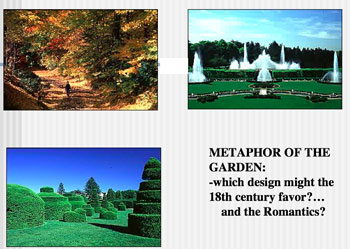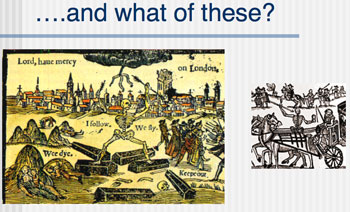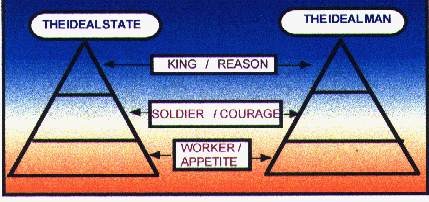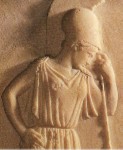 |
 |
||
EIGHTEENTH CENTURY BACKGROUND
 |
 |
||
I. THE PERIOD MARKED BY TWO BROAD ISSUES:
A. HUMAN NATURE AND THE RELATIONSHIP BETWEEN ORDER / CHAOS
B. DUALISTIC THINKING--EMPHASIS SEEMED TO BE ON REASON, BUT WOULD IT BE WRONG TO NEGLECT EMOTION?
C. MILTON'S PERSPECTIVE IN PARADISE LOST reflects first, the "mind / matter" dualism: "The mind is its own place, and in itself / Can make a Heaven of Hell, a Hell of Heaven" (Book I). Secondly,
1--RECALL THE TEMPTATION SCENE IN BOOK IX
2--SATAN’S AWARENESS OF THE MIND / MATTER DUALISM WHEN SEDUCING EVE
3. EQUIVOCATION AND THE TREE
4. THE FAIRNESS OF GOD?
D. EPISTEMOLOGICAL CONSIDERATIONS...
1.--LOCKE--respecting limits - reasonable Christianity
2.--DESCARTES---"And amongst many opinions all equally received, I chose only the most moderate...For since God has given to each of us some light with which to distinguish truth from error, I could not believe that I ought for a single moment to content myself with accepting the opinions held by others unless I had in view the employment of my own judgment in examining them..."[4 step method--”COGITO”]
3.--HOBBES--Is man naturally selfish?
E. WHAT DID EVE NOT UNDERSTAND THAT SATAN AND MILTON OBVIOUSLY DID?
II. NEED FOR ORDER--FOLLOWING THE PREVIOUS PERIOD:
A--[MACROCOSM]--THE CHAIN IS BACK BUT BASED ON ??
B--[MICROCOSM]--MAN OBEYS THE NATURAL LAW
C--SCIENTIFIC DESCRIPTION OF NATURE
D--NEWTON’S VIEW OF THE UNIVERSE AND GOD [SEE PRINTOUT BELOW]
III. REVIEW OF THE HISTORICAL / PHILOSOPHICAL PROCESS...(PARADOX)
A. NOTE THE THREE TRADITIONS THAT INFLUENCE THIS PERIOD
B. GOD WILL PUNISH MAN FOR HIS SINS--MEDIEVAL
C. SCIENTIFIC PROGRESS WILL LEAD TO A BETTER LIFE ON EARTH-- RENAISSANCE
D. NEOCLASSICAL--THE WISDOM OF THE ‘ANCIENTS’ IS BEST--GREECE
IV .WHAT MADE THE ENLIGHTENMENT "ENLIGHTENED?"
(Note: see the following source upon which this section was based: Brinton, C. The Shaping of th
e Modern Mind. N.Y. Mentor Books, 1953.)
V. WHAT IS MEANT BY THE TERM --WHAT KIND OF MIND-SET IS SUGGESTED?
A. "THE BELIEF THAT ALL HUMAN BEINGS CAN ATTAIN HERE ON THIS EARTH A STATE OF PERFECTION HITHERTO IN THE WEST ONLY THOUGHT TO BE POSSIBLE FOR CHRISTIANS IN A STATE OF GRACE AND FOR THEM ONLY AFTER DEATH".
B. RADICAL--WHY?
VI. ORIGINS--THINK OF HOBBES AND LOCKE AND DESCARTES:
A. MEN ARE BY NATURE SELFISH--EMERGENCE OF THE SOCIAL CONTRACT
B. BLANK SLATE--CONTROL THE ENVIRONMENT, SHAPE THE LEARNER
C. MODIFIED IDEALISM--THERE IS INNATE KNOWLEDGE INCLUDING GOD
D. WE HAVE A REASONALBE CHRISTIANITY--'DO UNTO OTHERS...'
VII. HOW DO WE ATTAIN THE ‘STATE OF PERFECTION'
A. THOUGH AN UNDERSTANDING OF NATURE WHICH IS NOW SEEN AS MORE AND MORE IN A SCIENTIFIC SENSE
B. HOW CAN WE DO THIS?--THROUGH R E A S O N
C. WHAT DOES REASON REVEAL?
1--CLASS DISTINCTIONS ARE STUPID
2--THE KING IS JUST A MAN LIKE US
3--REASON WILL REPLACE THE OLD MEDIEVAL AND RENAISSANCE SUPERSTITIONS
4.--WHAT WOULD BE THE IMPLICATION FOR RELIGION?
[sidebar--these conclusions will for the basis of the next
period we do--the ROMANTIC--revolution and the
key 18th philosopher--ROUSSEAU]
VIII. PROGRESS AND HISTORY
A.--THE ANGLO-SAXON VIEW WAS CIRCULAR--ring structure in Beowulf.
B.--CHRISTIAN = LINEAR--BORN - SIN - DIE - HEAVEN ???
C. --ENLIGHTENMENT MODIFICATION:
1--CHRISTIAN--FROM GOOD TO BAD
2--ENLIGHTENMENT--FROM BAD TO GOOD--WITH GOOD ON EARTH...
D. MAN CAN ACHIEVE A PERFECT UTOPIAN SOCIETY HERE ON EARTH--LINK:
1--GULLIVER’S TRAVELS AND PLATO’S IDEAL STATE IN THE REPUBLIC
2--IS IT TRUE?
IX. OUT OF THE SCIENTIFIC REVOLUTION COMES A MORAL ONE:
A--IT IS MORAL TO HAVE THIS HAPPINESS NOW--THE HEAVEN OF THE ENLIGHTENMENT IS ON EARTH.
B--PROGRESS WILL LEAD TO A BETTER LIFE HERE AND NOW--THE GOLDEN RULE IDEA--IT IS REASON APPLIED TO HUMAN AFFAIRS
X-- ‘PEACE ON EARTH AND GOODWILL TO MEN’ WILL NOW REALLY HAPPEN
XI. THE RELATIONSHIP BETWEEN REASON AND RELIGION RECALLS ATHENS IN THE FIFTH CENTURY, BCE, THE GOLDEN AGE OF SCIENCE, HISTORY, MEDICINE, AND PHILOSOPHY. CLICK HERE.
XII. WE CAN USE REASON TO UNDERSTAND NATURE AND THE NATURAL LAW
A. REASON COULD SHOW MEN HOW TO CONTROL THEIR ENVIRONMENT AND THEMSELVES
B. WHAT DOES NATURE SHOW US ABOUT THE ENVIRONMENT?
XIII. TO UNDERSTAND THE UNIVERSE SCIENTIFICALLY IS TO SEE IT AS A GIANT MACHINE THAT RUNS LIKE A CLOCK.
A--THE PARTS FIT TOGETHER TO PRODUCE A HARMONIOUS WHOLE--????ARE THERE ANY PROBLEMS WITH THIS? SEE: ‘ESSAY ON MAN’
B--THE NOTION IS: THE UNIVERSE OPERATES ACCORDING TO UNIVERSAL, PERMANENT AND UNCHANGING TRUTHS THAT WE CALL MATHEMATICAL LAWS OR LAWS OF NATURE
XIV. FROM WHERE DID THESE LAWS COME?---
A--GOD, BUT WHAT KIND OF GOD?
B--DOES THE CAR - MAKER COME TO YOUR HOUSE TO START YOUR CAR?
1--A REASONABLE GOD SETS THE UNIVERSE IN MOTION AND HAS NO FURTHER NEED TO WORK WITH IT ANY MORE BY DIRECT INTERFERENCE...
2--THIS IS CALLED D E I S M
C--NEWTON'S THOUGHT DOMINATED THE AGE; AT THE END OF HIS TREATISE OF MATHEMATICS AND PHYSICS, THE PRINCIPIA, HE ADDRESSED GOD'S ROLE IN THE UNVERSE HE HAD DEFINED IN MATHEMATICAL TERMS:
The six primary planets are revolved about the sun in circles concentric with the sun, and with motions directed towards the same parts, and almost in the same plane. Ten moons are revolved about the earth, Jupiter, and Saturn, in circles concentric with them, with the same direction of motion, and nearly in the planes of the orbits of those planets; but it is not to be conceived that mere mechanical causes could give birth to so many regular motions, since the comets range over all parts of the heavens in very eccentric orbits; for by that kind of motion they pass easily through the orbs of the planets, and with great rapidity; and in their aphelions, where they move the slowest, and are detained the longest, they recede to the greatest distances from each other, and hence suffer the least disturbance from their mutual attractions. This most beautiful system of the sun, planets, and comets, could only proceed from the counsel and dominion of an intelligent and powerful Being. And if the fixed stars are the centres of other like systems, these, being formed by the like wise counsel, must be all subject to the dominion of One; especially since the light of the fixed stars is of the same nature with the light of the sun, and from every system light passes into all the other systems: and lest the systems of the fixed stars should, by their gravity, fall on each other, he hath placed those systems at immense distances from one another.
This Being governs all things, not as the soul of the world, but as Lord over all; and on account of his dominion he is wont to be called Lord God pantokrator, or Universal Ruler; for God is a relative word, and has a respect to servants; and Deity is the dominion of God not over his own body, as those imagine who fancy God to be the soul of the world, but over servants. The Supreme God is a Being eternal, infinite, absolutely perfect; but a being, however perfect, without dominion, cannot be said to be Lord God; for we say, my God, your God, the God of Israel, the God of Gods, and Lord of Lords; but we do not say, my Eternal, your Eternal, the Eternal of Israel, the Eternal of Gods; we do not say, my Infinite, or my Perfect: these are titles which have no respect to servants. The word 'God' usually signifies Lord; but every lord is not a God. It is the dominion of a spiritual being which constitutes a God: a true, supreme, or imaginary dominion makes a true, supreme, or imaginary God. And from his true dominion it follows that the true God is a living, intelligent, and powerful Being; and, from his other perfections, that he is supreme, or most perfect. He is eternal and infinite, omnipotent and omniscient; that is, his duration reaches from eternity to eternity; his presence from infinity to infinity; he governs all things, and knows all things that are or can be done. He is not eternity and infinity, but eternal and infinite; he is not duration or space, but he endures and is present. He endures forever, and is everywhere present- and, by existing always and everywhere, he constitutes duration and space. Since every particle of space is always, and every indivisible moment of duration is everywhere, certainly the Maker and Lord of all things cannot be never and nowhere. Every soul that has perception is, though in different times and in different organs of sense and motion, still the same indivisible person. There are given successive parts in duration, coexistent parts in space, but neither the one nor the other in the person of a man, or his thinking principle; and much less can they be found in the thinking substance of God. Every man, so far as he is a thing that has perception, is one and the same man during his whole life, in all and each of his organs of sense. God is the same God, always and everywhere. He is omnipresent not virtually only, but also substantially; for virtue cannot subsist without substance. In him are all things contained and moved; yet neither affects the other: God suffers nothing from the motion of bodies; bodies find no resistance from the omnipresence of God. It is allowed by all that the Supreme God exists necessarily; and by the same necessity he exists always and everywhere.
Whence also he is all similar, all eye, all ear, all brain, all arm, all power to perceive, to understand, and to act; but in a manner not at all human, in a manner not at all corporeal, in a manner utterly unknown to us. As a blind man has no idea of colours, so have we no idea of the manner by which the all-wise God perceives and understands all things. He is utterly void of all body and bodily figure, and can therefore neither be seen, nor heard, nor touched; nor ought he to be worshiped under the representation of any corporeal thing. We have ideas of his attributes, but what the real substance of anything is we know not. In bodies, we see only their figures and colours, we hear only the sounds, we touch only their outward surfaces, we smell only the smells, and taste the savours; but their inward substances are not to be known either by our senses, or by any reflex act of our minds: much less, then, have we any idea of the substance of God. We know him only by his most wise and excellent contrivances of things, and final causes; we admire him for his perfections; but we reverence and adore him on account of his dominion: for we adore him as his servants; and a god without dominion, providence, and final causes, is nothing else but Fate and Nature. Blind metaphysical necessity, which is certainly the same always and everywhere, could produce no variety of things. All that diversity of natural things which we find suited to different times and places could arise from nothing but the ideas and will of a Being necessarily existing. But, by way of allegory, God is said to see, to speak, to laugh, to love, to hate, to desire, to give, to receive, to rejoice, to be angry, to fight, to frame, to work, to build; for all our notions of God are taken from the ways of mankind by a certain similitude, which, though not perfect, has some likeness, however. And thus much concerning God; to discourse of whom from the appearances of things, does certainly belong to Natural Philosophy.
Hitherto we have explained the phenomena of the heavens and of our sea by the power of gravity, but have not yet assigned the cause of this power. This is certain, that it must proceed from a cause that penetrates to the very centres of the sun and planets, without suffering the least diminution of its force; that operates not according to the quantity of the surfaces of the particles upon which it acts (as mechanical causes used to do), but according to the quantity of the solid matter which they contain, and propagates its virtue on all sides to immense distances, decreasing always as the inverse square of the distances. Gravitation towards the sun is made up out of the gravitations towards the several particles of which the body of the sun is composed; and in receding from the sun decreases accurately as the inverse square of the distances as far as the orbit of Saturn, as evidently appears from the quiescence of the aphelion of the planets; nay, and even to the remotest aphelion of the comets, if those aphelions are also quiescent.
But hitherto I have not been able to discover the cause of those properties of gravity from phenomena, and I frame no hypotheses; for whatever is not deduced from the phenomena is to be called an hypothesis; and hypotheses, whether metaphysical or physical, whether of occult qualities or mechanical, have no place in experimental philosophy. In this philosophy particular propositions are inferred from the phenomena, and afterwards rendered general by induction. Thus it was that the impenetrability, the mobility, and the impulsive force of bodies, and the laws of motion and of gravitation, were discovered. And to us it is enough that gravity does really exist, and act according to the laws which we have explained, and abundantly serves to account for all the motions of the celestial bodies, and of our sea...
Click here for more about Newton, and other philosophers: (This is an excellent philosophy site.)
XV. THERE STARTED TO DEVELOP AN ‘ANTI-CLERIC’ MENTALITY, GIVEN THAT ‘ORGANIZED’ RELIGIONS ETC. WERE RESPONSIBLE FOR HOLDING BACK THE REASONABLE PURSUIT OF PERFECTION----BUT...ENLIGHTENMENT AND CHRISTIANITY BOTH SAY...
A. MAN’S HAPPINESS - PROGRESS NOW
B. MAN CAN MAKE A MORAL EFFORT TOWARD A BETTER LIFE...HOWEVER WE DEFINE IT
XVI. MAJOR PROBLEM--WHERE DID EVIL COME FROM IN THE WORLD, IF THE CHRISTIAN IDEA OF ‘ORIGINAL SIN’ NO LONGER MADE SENSE [ROUSSEAU]
A. NOTION OF SELFISHNESS IN THE ACQUISITION OF PROPERTY
B. SO THAT MAN SEEMS TO BE BORN IN A STATE OF PERFECTION THAT HIS REASON CAN HELP HIM ACTUALIZE, BUT HE IS MADE BAD BY SOCIETY
C. MAJOR PARADOX
XVII. WHAT DOES THIS MEAN FOR THE HISTORICAL PROCESS TO THE PERFECT STATE?
A--WE HAVE TO WORK OUT THE BALANCE BETWEEN THE CONFLICTING ELEMENTS IN SOCIETY--
1--LAWS
2--CHURCH
3--STATE
4--EDUCATION
XVIII. THE MATTER OF PRESIDENT CLINTON-
A. THE IMPEACHMENT PROCESS IS A PRODUCT OF THE ENLIGHTENMENT ERA OF "CHECKS AND BALANCES”
B. INVESTIGATED BY THE HOUSE
C. USE OF SPECIAL PROSECUTORS
D. TRIED BY THE SENATE--2/3RDS NEEDED
C. PRESIDED OVER BY THE CHIEF JUSTICE
XIX. ENLIGHTENMENT PHILOSOPHY BECOMES THE IDEA THAT ALL SHOULD BE DONE TO INSURE THE GREATEST HAPPINESS FOR THE GREATEST NUMBER.
A--DEMOCRACY?
B--GENERAL WILL?
C--WHAT MODELS CAN WE USE?
1--THAT WITH THE GREATEST AUTHORITY
2--THAT WHICH HAS SURVIVED THE TEST OF TIME
3--HENCE THE CLASSICAL PAST [THIS IS THE NEO-CLASSICAL PERIOD] SINCE THE GREAT AUTHORITIES OF GREECE AND ROME HAVE SURVIVED]
D. PLATO’S PHILOSOPHY AND THE IDEAL STATE AND ITS INHABITANTS:

E. ARISTOTLE’S ETHICS AND ‘THE GOLDEN MEAN:
|
|
|
|
|
|
|
|
|
|
|
|
licentiousness |
|
|
| getting/spending |
|
magnificence |
|
|
|
|
magniminity |
|
|
|
|
|
|
|
|
|
|
|
|
|
|
|
|
|
|
|
|
|
(source: Aristotle Ethics, Trans. by J.A.K. Thompson,
notes by Hugh Trendennick; introduction
by Jonathan Barnes. N.Y.: Penguin, 1976.)
F. HOMER’S EPICS
G. ‘ROME IS ETERNAL’
XX. SO CAN PERFECTION BE ACHIEVED?
A. WHAT IS THE EVIDENCE?
B. WHAT ARE THE COUNTER ARGUMENTS?
C. WHAT ARE THE ETHICAL IMPLICATIONS ON EARTH FOR HAPPINESS:
1--FOR YOU?
2--FOR ME?
3--FOR THE FAMILY?
4--FOR THE CITY?
5--FOR THE NATION?
6--FOR THE WORLD?
D. WE ARE AGAIN ASKING THE OLD QUESTION- WHAT IS REASONABLE TO BELIEVE?
1--THE SOCIAL CONTRACT?
2--THE CONSTITUTION OF THE US?
3--COMMON SENSE?
XXI. A SHIFT IN THINKING WILL OCCUR THAT WE WILL DEFINE LATER AS ROMANTICISM WHEN WE START TO NOTE THAT PERHAPS REASON IS NOT ENOUGH TO MAKE THE PERFECT STATE, AND THAT WE SHOULD F E E L P I T Y AND S O R R O W FOR THOSE LESS FORTUNATE.
XXII. Key philosophers and thinkers
A. Rousseau--will be discussed under romanticism
B. Newton--impact of the natural law and science
C. influence of Descartes and Locke
D. importance of epistemological questions
E. Pope's "Essay on Man" philosophical poetry
XXIII. Literary theory:
A. classical writers--Plato / Aristotle / Horace / Homer / Virgil, so why the Greeks:
WITH REGARD TO EXCELLENCE, IT IS NOT ENOUGH TO KNOW BUT WE MUST TRY TO HAVE AND USE IT--ARISTOTLE POPE THUS WROTE IN IMITATION OF THE ANCIENT WISDOM: TRUE EASE IN WRITING COMES FROM ART NOT CHANCE,
1--LOVE OF THE ANCIENTS DEFINED WISDOM:
DESTINY AWAITS ALIKE FOR THE FREE MAN AS WELL AS HIM ENSLAVED BY ANOTHER’S MIGHT--AESCHYLUS
WONDERS ARE MANY, AND NONE IS MORE WONDERFULTHAN MAN--SOPHOCLES
THE DIRECTION IN WHICH EDUCATION STARTS A MAN WILL DETERMINE HIS FUTURE LIFE--PLATO
AS IN THE OLYMPIC GAMES IT IS NOT THE MOST BEAUTIFUL AND STRONGEST WHO RECEIVE THE CROWN, BUT THOSE WHO ACTUALLY ENTER THE COMBAT, FOR FROM THOSE COME THE VICTORS, SO IT IS THOSE WHO ACT THAT WIN RIGHTLY WHAT IS NOBLE AND GOOD IN LIFE.-- ARISTOTLE
2--THE EIGHTEENTH CENTURY MIND SEARCHED FOR A MODE THAT WOULD EXPRESS THESE THOUGHTS ACCORDING TO THE LAW OF ASSOCIATIVE ATTRACTION”
WORDS ARE LIKE LEAVES, AND WHERE THEY MOST ABOUND MUCH FRUIT OF SENSE BENEATH IS RARELY FOUND
AS THOSE MOVE EASIEST WHO HAVE LEARNED TO DANCE
TRUE WIT IS TO NATURE TO ADVANTAGE DRESSED
WHAT OFT WAS THOUGHT, BUT NE’ER SO WELL EXPRESS
B. Eighteenth century esthetics and the relationship between form and content
1.balance & order
2. irony and satire
3. harmony
4. decorum
5. restraint
6. lots of [controlled] emotion...
XXIV. IN POETRY, THE FORM WAS THE ‘HEROIC COUPLET’: TWO LINES OF RHYMED VERSE IN IAMBIC PENTAMETER
We think our fathers fools, so wise we grow.
Our wiser sons no doubt will think us so
XXV. IN PROSE, THE SAME RULES APPLY EXCEPT NO RHYME;'
XXVI. THE CONTENT WAS THE HUMAN CONDITION--SEE POPE'S 'ESSAY ON MAN" works:
A. influence of nature--respect for tradition
B. limits placed on what the mind (imagination) can create- Locke
C. great age of wit, satire, irony, SWIFT and POPE--appearance vs. reality
XXVII. THE LITERATURE WE WILL STUDY INCLUDE:
A. ESSAY ON MAN (POPE)
B. MODEST PROPOSAL (SWIFT)
C. GULLIVER'S TRAVELS BOOK IV (SWIFT)
D. RAPE OF THE LOCK (POPE)
XXVIII. WHY WOULD THE AGE OF OPTIMISM AND HOPE BE THE GREATEST AGE OF SATIRE IN ENGLISH LITERARY HISTORY?
THE LITERATURE MAY BE FOUND IN THE TEXBOOK OR ON LINE. CLICK HERE.
| 1. Man and his relationship to the macrocosm
2. The relationship between man and God and the role of order. 3. Man's chief asset and defect and their paradoxical relationship. 4. The importance of the chain of being. 5. The paradox of human nature. 6. The role of self-love and passions in human nature. 7. The relationship between man, nature. 8. How self-love relates to social awareness. 9. How man can achieve happiness. 10. Pay special attention to the "Know then thyself..." passage that is also in the textbook. 11.Be able to explain the relationship between form and content in Neo-Classical poetry to include: heroic couplet, understatement, irony, wit, and paradox. |
|||||||
 |
|||||||
|
|
|||||||
| (Source: J.A.K. Thompson, Trans.]Aristotle: Ethics.N.Y.: Penguin Classics, 1976) | |||||||
CLASSICAL GREEK PHILOSOPHY, LITERATURE AND HISTORY
THE EIGHTEENTH CENTURY: THE NEO-CLASSICAL AGE OR THE AGE OF REASON CURRICULUM LINKS